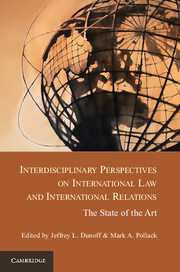 Interdisciplinary Perspectives on International Law and International Relations
Interdisciplinary Perspectives on International Law and International Relations Book contents
- Frontmatter
- Contents
- Contributors
- Acknowledgments
- Part I Introduction: Setting the Stage
- Part II Theorizing International Law
- 3 Institutionalism and International Law
- 4 Liberal Theories of International Law
- 5 Constructivism and International Law
- 6 Wanted – Dead or Alive
- Part III Making International Law
- Part IV The Interpretation and Application of International Law
- Part V Enforcement, Compliance, and Effectiveness
- Conclusions
- Index
- References
4 - Liberal Theories of International Law
Published online by Cambridge University Press: 05 January 2013
- Frontmatter
- Contents
- Contributors
- Acknowledgments
- Part I Introduction: Setting the Stage
- Part II Theorizing International Law
- 3 Institutionalism and International Law
- 4 Liberal Theories of International Law
- 5 Constructivism and International Law
- 6 Wanted – Dead or Alive
- Part III Making International Law
- Part IV The Interpretation and Application of International Law
- Part V Enforcement, Compliance, and Effectiveness
- Conclusions
- Index
- References
Summary
Liberal theories of international relations (IR) focus on the demands of individuals and social groups, and their relative power in society, as fundamental forces driving state policy. For liberals, every state is embedded in an interdependent domestic and transnational society that decisively shapes the basic purposes or interests that underlie its policies, its interaction with other states, and, ultimately, international conflict and order. This “bottom-up” focus of liberal theories on state–society relations, interdependence, and preference formation has distinctive implications for understanding international law (IL). In recent years liberal theory has been among the most rapidly expanding areas of positive and normative analysis of international law. As the world grows more and more interdependent and countries struggle to maintain cooperation amid diverse economic interests, domestic political institutions, and ideals of legitimate public order, international law will increasingly come to depend on the answers to questions that liberal theories pose.
The first section of this chapter (“Liberal Theories of International Relations”) elaborates the assumptions and conclusions of liberal international relations theory. Section II (“What Can Liberal Theories Tell Us about International Law-Making?”) develops liberal insights into the substantive scope and depth of international law, its institutional form, compliance, and long-term dynamic processes of evolution and change. Section III (“International Tribunals: Liberal Analysis and Its Critics”) examines the specific case of international tribunals, which has been a particular focus of liberal theorizing, and treats both conservative and constructivist criticisms of liberal theory. Section IV (“Liberalism as Normative Theory”) considers the contribution of liberal theory to policy, as well as to conceptual and normative analyses of international law.
- Type
- Chapter
- Information
- Interdisciplinary Perspectives on International Law and International RelationsThe State of the Art, pp. 83 - 118Publisher: Cambridge University PressPrint publication year: 2012
References
- 17
- Cited by


